Brains, Like Plants, Never Stop Growing
New varieties, new procedures not to mention the new gardeners each year with dozens of question. Keeping up to date with the industry takes as much work as caring for your inventory. However, your expertise, including knowing which plants will work best in your area, is your competitive advantage over big boxes. So, just as your plants, your brain should never stop growing, and the “fertilizer” is continuing education.
Knowing Where to Start
If you’re not located near a college with a horticultural program, there are other options available to you. Your local Cooperative Extension offi ce is a good place to start; their universities offer programs tailored to the industry. Trade organizations may also frequently offer training and certifi cation for your workers.
The Ohio Nursery and Landscape Association (ONLA), which celebrates its 100th anniversary this year, sponsors its Central Environmental Nursery Trade Show (CENTS) each January. In addition to the trade show, educational workshops administered by Ohio State University (OSU) allow attendees to gain or renew certifications.
“We tried to do standalone education, but that hasn’t worked well. People wait for the CENTS short course, send one employee to each track, then when they get home, they trade notes with each other,” says ONLA Executive Director Bill Stalter. “ONLA sponsors the Ohio Certifi ed Nursery Technician program, which is mostly self-study. We administer tests during CENTS and in the summer. People can also qualify for the Master Ohio Certifi ed Nursery Technician status, which involves three areas: landscape, retail center and grower tests. Also, ONLA gets the word out to the public: Shop where Certifi ed Technicians are employed.”
“We’ve partnered with ONLA since 1931,” says Cheryl Cuthbert, program coordinator for OSU’s Department of Horticulture and Crop Science. “CENTS’ educational sessions occur two out of three days around trade show hours, with special workshops on the weekend. We offer up to 11 tracks per day, perhaps four sessions for arborists, four for soil conservation and so on.
“As for our topics, we get suggestions from an ONLA short course program committee, and from its members. They might say, ‘We need to know more about X,’ or ‘We’d like to hear this speaker,’ or ‘This is a hot topic.’ We start planning in February for the next January’s program!”
Farther south, where the growing season never ends, the Florida Nursery, Growers & Landscape Association (FNGLA) keeps busy, offering certifi – cations for horticulture professionals, landscape technicians, landscape contractors and landscape designers. Classes are scheduled during its Tropical Plant Industry Exhibition (TPIE) each winter and FNATS show in the fall. FNGLA’s website (www.fngla.org) also lists a variety of other educational opportunities, including university horticulture schools, junior colleges and various Cooperative Extension offi ces. Taking advantage of the Internet, FNGLA also offers online certifi cation training.
Gathering Information from Everywhere
In Cincinnati, Ohio, White Oak Garden Center President Jeff Webeler benefi ts from nearby college horticultural programs.
“We hire people trained in the fi eld. We get many co-op students from Cincinnati State’s horticultural program, and University of Cincinnati has a good program, too,” Webeler says. “Of course, there’s nothing like onthe- job training.”
Webeler currently has 10 ONLA-certifi ed nursery technicians on staff, and a few more are studying for the certifi cation. “Every year they must get more credits to remain certifi ed; some take the short course at CENTS or OFA. The Ohio State Cooperative Extension offi ce in Hamilton County also offers some great classes. We never stop learning.”
“Six of us went to CENTS this year,” he says. “We also attend the OFA Short Course in summer, which is a great program for greenhouse growers. People from all over the world come to the OFA show.”
Some “education” comes right to White Oak’s fax: “During the season, Hamilton County Extension sends a weekly plant pest fax. I’ll tell our staff to protect our plants and also be prepared to identify pests for customers.”
Webeler also believes in educating his customers: “For years we’ve sponsored free gardening classes at local libraries, led by various experts on our staff. This public service helps us promote ourselves as experts on plants; when people have problems they contact us.”
Providing On-the-Job Training
Kevin Riley, co-owner of Florida’s Rockledge Gardens with his wife, Teresa, prefers to keep his training in-house.
“Most of our employees’ knowledge is gained after we hire them. If they’ve been trained already in the fi eld, great. Otherwise, we’re mostly looking for people skills and a love of plants. We’ll teach them whatever else they need to know.”
Riley, who’s operated the business for more than 30 years, makes a wide variety of resources available to his employees. “We have a staff information kiosk, which includes reference books and Internet access. We share our trade journals and pick out articles of interest to discuss in staff meetings. We do send our workers to tours and GCA trial gardens, and visit other nurseries when we can. Our staff love plants, and usually share new information with each other.”
Training new hires isn’t an everyday task: “We have very little turnover,” Riley says. “Our ‘woody plants’ specialist has been with us 25 years, and another employee has been with us nine years. Due to their personal interests, each employee has specialties, so when a customer has a question, they can confer with another employee.”
Some members of Rockledge’s staff have FNGLA certifi cations. “I have one,” Riley reports. “I think I was the 19th person to get one. I do go to the FNGLA workshops and sometimes send employees, but since the classes aren’t taught locally, that can be a problem. Florida’s growing season is year round; we can’t just shut down and all go to a conference.”







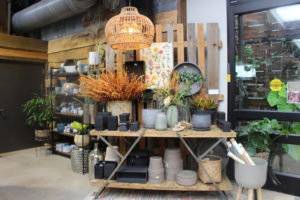
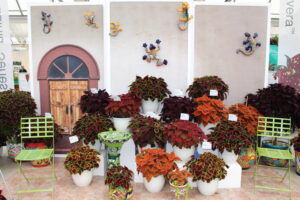
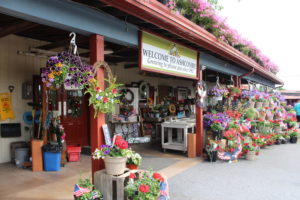


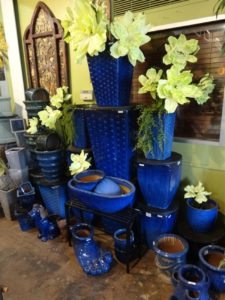


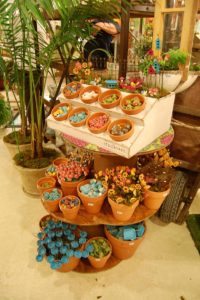
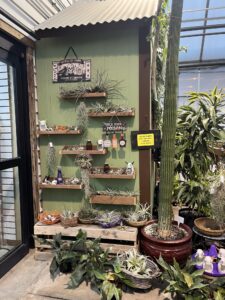
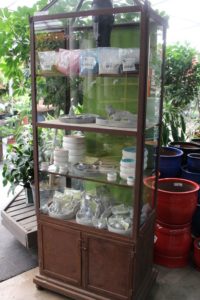
 Videos
Videos





